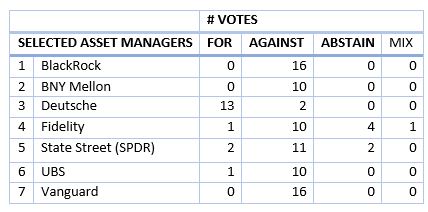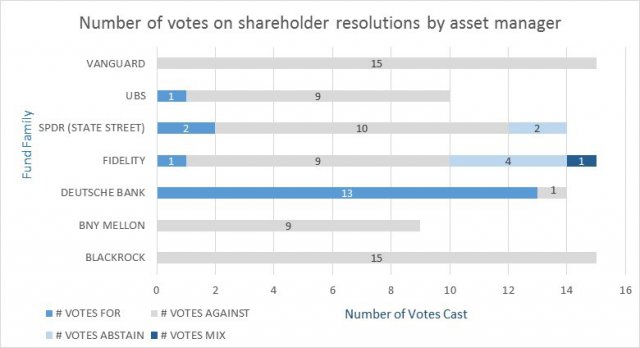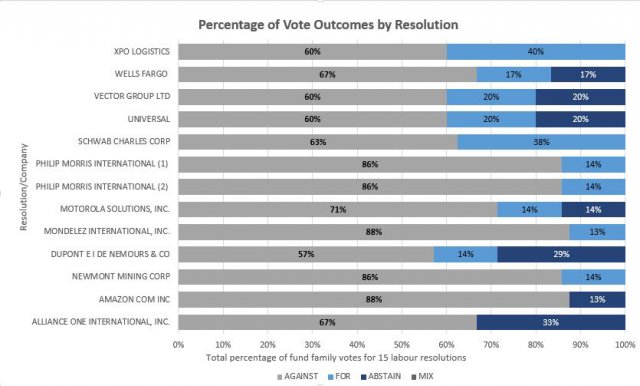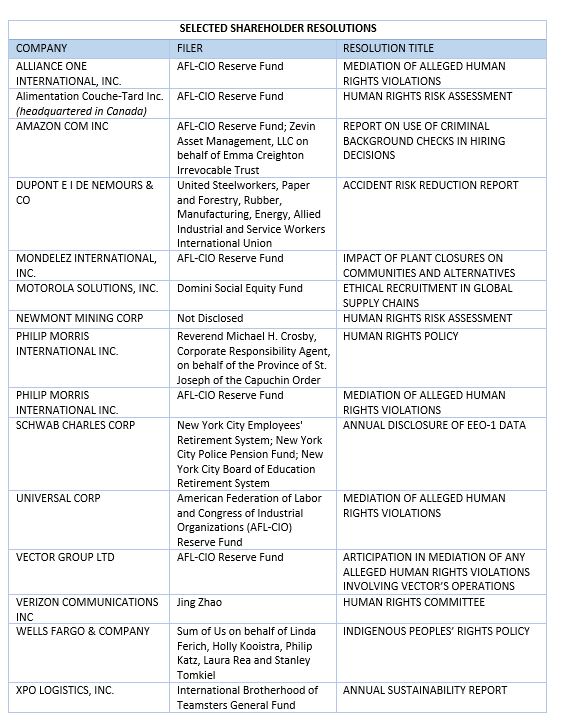How did global asset managers vote on resolutions targeting workers’ rights and labour standards?
BlackRock chairman and chief executive Larry Fink’s statement last month to the boards of the companies in which the world’s largest asset manager invests that “every company must not only deliver financial performance but also show how it makes a positive contribution to society” was met with a mix of reactions.
Some enthusiastically noted that telling companies they “must benefit all their stakeholders, including shareholders, employees, customers and the communities in which they operate” is particularly effective when one has $6.3 tn in assets under management. Others pointed to BlackRock’s abysmal proxy voting record on issues such as climate and governance, questioning whether it would back up its bold statement with effective action.

Many of the worker-nominated trustees on pension fund boards delegate investment management to large asset managers including – but not limited to – BlackRock. And many trustees have commented that the asset managers their fund contracts make decisions that do not align with a long-term investment view that embraces the integration of environmental, social and governance (ESG) factors.

With this in mind, we took a closer look at how the world’s largest asset managers perform on issues related to workers’ rights and labour standards. Because proxy voting is a window into how asset managers approach ESG issues, we looked at the proxy voting records of large global asset managers used by pension funds across the world to examine how they voted on shareholder resolutions on workers’ rights and labour standards in the USA and Canada. The seven asset managers we selected ranked in the I&PE Largest Global Asset Managers 2016 Survey, were headquartered in several different countries, disclosed their voting in their July 1 2016 – June 30 2017 N-PX filings and are UN Principles for Responsible Investment (UNPRI) signatories. We then selected 15 shareholder resolutions that were either put forward by investors in the CWC network and/or classified as a workplace conditions/worker treatment issues.
If the proxy voting performance of our seven global asset managers is any indication of their approach to issues related to workers, we can safely conclude that there is ample scope for improvement. [1]
BlackRock, BNY Mellon and Vanguard voted against every labour-related resolution for the holdings on our list. UBS only supported one labour resolution (Human Rights Risk Assessment at Alimentation Couche Tard). State Street and Fidelity had more of a mixed result, with votes against resolutions still dominating their records. The notable exception was Deutsche Bank, which voted in favour of all resolutions with the exception of the criminal record background checks proposal at Amazon.

We were not expecting the results to be overwhelmingly positive. Numerous proxy audits and surveys conducted over many years indicate that the world’s largest asset managers tend to vote against shareholder resolutions that aim to improve a company’s ESG performance. Preventable Surprises, for instance, reported in December 2017 that BlackRock, BNY Mellon and Vanguard voted against all nine climate risk disclosure resolutions filed by shareholders of US utility companies. [2] Likewise, BlackRock, Vanguard, BNY Mellon and State Street were among the large asset managers ranked in the bottom tierin the AFL-CIO’s 2017 Key Votes Survey due to their inconsistency with the AFL-CIO Proxy Voting Guidelines.

Larry Fink’s statement to the boards of BlackRock’s investees sparked much discussion because the world’s largest asset managers wield sizable influence in the investment chain. BlackRock, Vanguard and State Street, for instance, constitute the largest shareholder in 88 percent of companies in the S&P 500. The three firms also manage more than $14tn in assets.
If we are to ensure that workers’ retirements savings are managed in a way that reflects their interests, fixing the accountability links on ESG issues between asset owner and asset manager is of strategic importance. Throughout 2018, the CWC will be working with its trustee network to apply sustained and coordinated pressure on large PRI signatory asset managers whose rhetoric on sustainability does not match their actual record on asset stewardship.
To find out more or get involved in this work, contact Tamara Herman at therman@share.ca.
SHAREHOLDER RESOLUTIONS

Footnotes
[1] Note that the votes of specific funds varied within an asset manager’s fund family. We indicated the voting result based on the voting of 50% or more of the funds in the fund family that are disclosed in N-PX filings. In one case, the funds within a fund family tied. We scored this result as a “mix.”
[2] Both asset managers provided statements expressing a preference for private engagement over public proxy votes.


